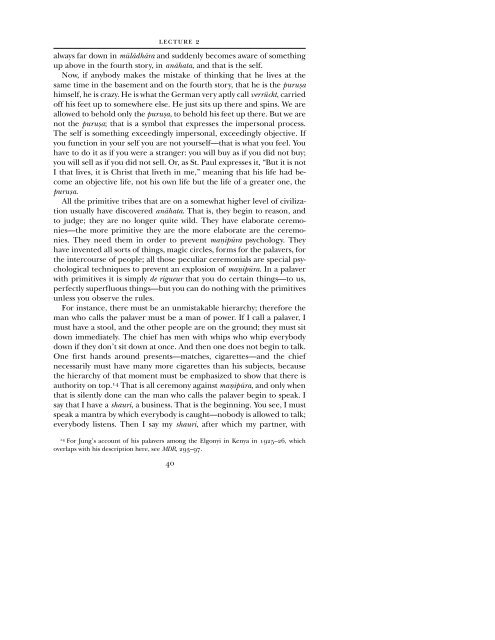CG JUNG - Countryside Anarchist
CG JUNG - Countryside Anarchist
CG JUNG - Countryside Anarchist
You also want an ePaper? Increase the reach of your titles
YUMPU automatically turns print PDFs into web optimized ePapers that Google loves.
LECTURE 2<br />
always far down in mÖlvdhvra and suddenly becomes aware of something<br />
up above in the fourth story, in anvhata, and that is the self.<br />
Now, if anybody makes the mistake of thinking that he lives at the<br />
same time in the basement and on the fourth story, that he is the puruüa<br />
himself, he is crazy. He is what the German very aptly call verrückt, carried<br />
off his feet up to somewhere else. He just sits up there and spins. We are<br />
allowed to behold only the puruüa, to behold his feet up there. But we are<br />
not the puruüa; that is a symbol that expresses the impersonal process.<br />
The self is something exceedingly impersonal, exceedingly objective. If<br />
you function in your self you are not yourself—that is what you feel. You<br />
have to do it as if you were a stranger: you will buy as if you did not buy;<br />
you will sell as if you did not sell. Or, as St. Paul expresses it, “But it is not<br />
I that lives, it is Christ that liveth in me,” meaning that his life had become<br />
an objective life, not his own life but the life of a greater one, the<br />
puruüa.<br />
All the primitive tribes that are on a somewhat higher level of civilization<br />
usually have discovered anvhata. That is, they begin to reason, and<br />
to judge; they are no longer quite wild. They have elaborate ceremonies—the<br />
more primitive they are the more elaborate are the ceremonies.<br />
They need them in order to prevent maõipÖra psychology. They<br />
have invented all sorts of things, magic circles, forms for the palavers, for<br />
the intercourse of people; all those peculiar ceremonials are special psychological<br />
techniques to prevent an explosion of maõipÖra. In a palaver<br />
with primitives it is simply de rigueur that you do certain things—to us,<br />
perfectly superfluous things—but you can do nothing with the primitives<br />
unless you observe the rules.<br />
For instance, there must be an unmistakable hierarchy; therefore the<br />
man who calls the palaver must be a man of power. If I call a palaver, I<br />
must have a stool, and the other people are on the ground; they must sit<br />
down immediately. The chief has men with whips who whip everybody<br />
down if they don’t sit down at once. And then one does not begin to talk.<br />
One first hands around presents—matches, cigarettes—and the chief<br />
necessarily must have many more cigarettes than his subjects, because<br />
the hierarchy of that moment must be emphasized to show that there is<br />
authority on top. 14 That is all ceremony against maõipÖra, and only when<br />
that is silently done can the man who calls the palaver begin to speak. I<br />
say that I have a shauri, a business. That is the beginning. You see, I must<br />
speak a mantra by which everybody is caught—nobody is allowed to talk;<br />
everybody listens. Then I say my shauri, after which my partner, with<br />
14 For Jung’s account of his palavers among the Elgonyi in Kenya in 1925–26, which<br />
overlaps with his description here, see MDR, 293–97.<br />
40


